Where is she now? Learn how Caring for Our Watersheds has left a lasting legacy for Maven from Alberta, Canada.
Author Archives: Chloe Sprecker
Post navigation

Removing the Stains that Microplastics Create
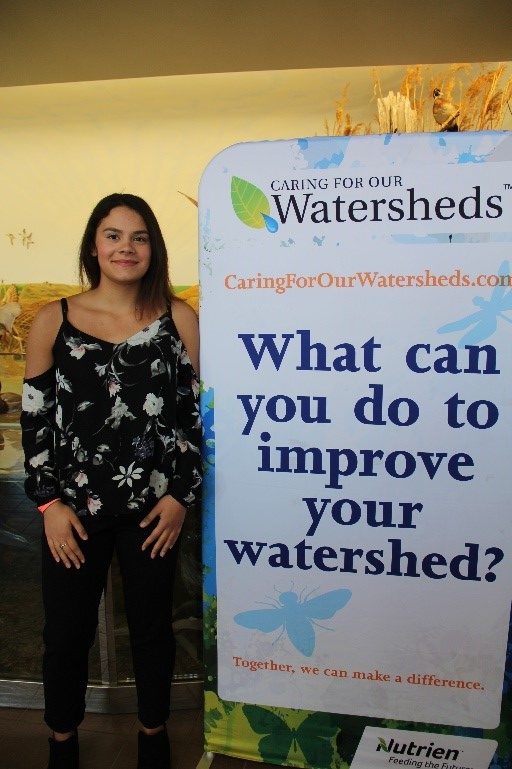 2019, Selkirk, Manitoba, Canada
2019, Selkirk, Manitoba, Canada
Sarah Cadotte, a student from Lord Selkirk Regional Comprehensive Secondary School, wanted to tackle the issue of microplastics in our watershed that come from fibres that drain out of our washing machines when we clean our clothes. She found a product that helps filter out these tiny pieces of fibre by attaching to washing machine drainage hoses. She obtained permission to have three of them installed within her school division. The filters can be emptied into the trash where the plastic pieces can be properly disposed of, rather than making their way into our water systems.
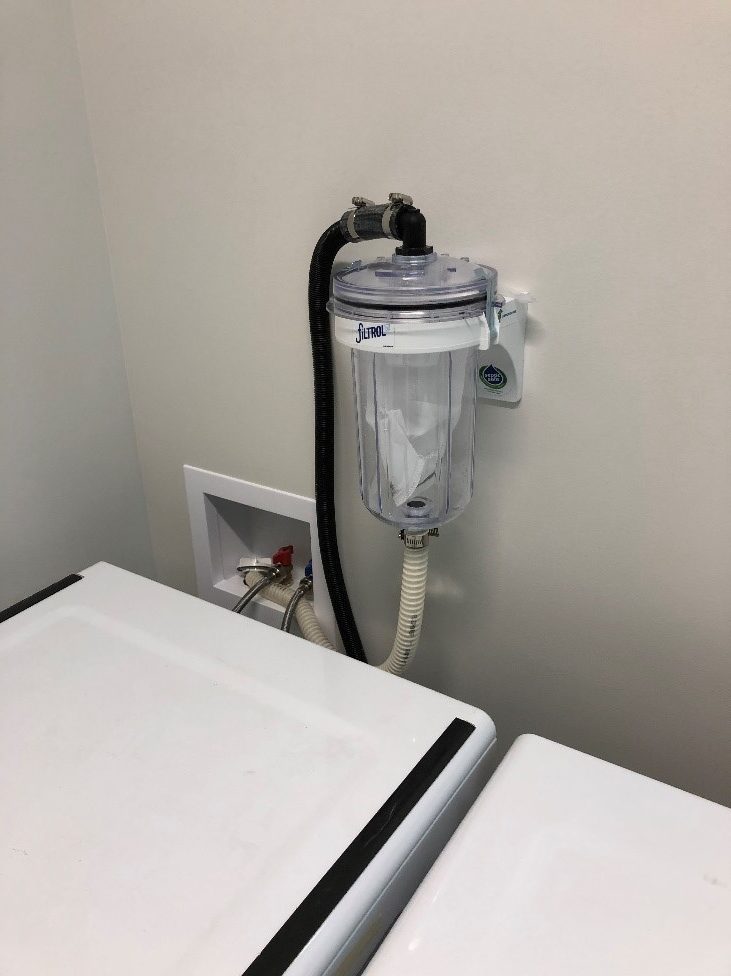
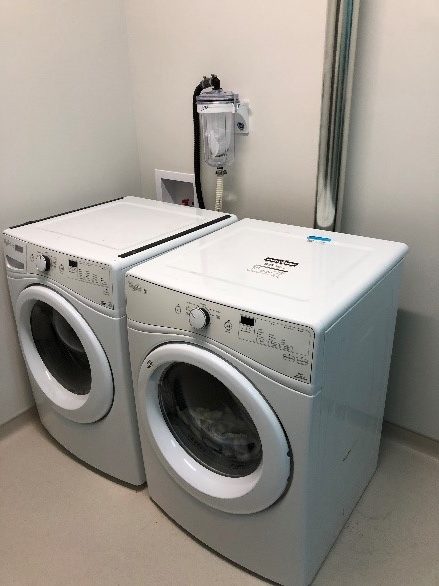
“If I can inspire my community to take action, even in something as small as installing a filter, then maybe there’s a greater hope that eventually, more people can become more economically aware of what’s going on in our waters and how even the smallest things can make great impacts.”
Rochelle Jacks, Teacher at Mira Loma High School, Sacramento California
“The CFW competition has been an effective way to deepen student understanding of the local and global environmental issues we face and the complexity involved in addressing them. It empowers students to take action in a way that is both feasible and measurable, providing a unique opportunity to develop engineering, service learning and project management skills. The proposal allows for a large degree of student choice both in the topic and means of addressing the issue, so they are authentically engaged in the research and planning of their project. That level of ownership is fundamental to a meaningful learning experience.”
Caring for Our Watersheds wins national conservation award
The Canadian Wildlife Federation named Nutrien the 2019 recipient of the Youth Mentor Award for its Caring for Our Watersheds (CFW) program.
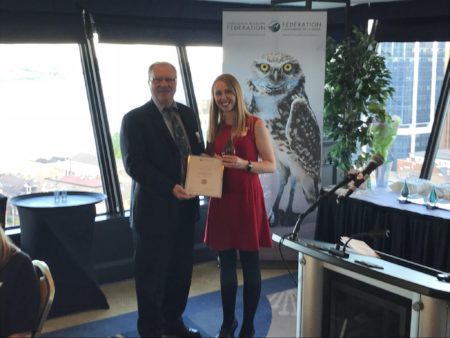
The Youth Mentor Award recognizes an individual or group that creates, presents or encourages conservation, habitat, or wildlife programs to the youth of Canada.
“It is a true honor to be recognized by a revered environmental organization like the Canadian Wildlife Federation and to be part of a program that is driving positive change in our local watersheds,” said Chloe Sprecker, Nutrien’s 2019 Education Program Coordinator.
CFW was launched in 2007, with the premise to turn student ideas into environmental solutions. Since then, over 30,000 students have participated in the program.
“It has been an outstanding year,” says Chloe. “Thanks to the knowledge and effort of our community partners, we’re reaching more students, receiving more entries and most importantly, these students are implementing their environmental solutions to protect and improve their local watershed.”
In its biggest year yet, there will be approximately 2,300 contest entries this school year from students looking to improve their local watershed in Canada, the United States and Argentina. As the quantity of entries grow, so does the quality of student ideas getting more impressive and diverse each year.
As of 2019, more than 425 student-led solutions have been implemented to improve watersheds around the world. With funding provided by Nutrien, and support from over 300 community partners and volunteers globally, we will continue to bring these incredible ideas to life.
Pilot Mound Rain Gardens
 2019, Pilot Mound, Manitoba, Canada
2019, Pilot Mound, Manitoba, Canada
Colin Hildebrand, Joryn Buchanan, Donovan Kimball, and Riley Kimball are all students at Pilot Mound Collegiate in Pilot Mound, MB. When they were posed with the question of what they could do to improve their watershed, their thoughts took them outside to their schoolyard.
“Our problem lies in the excess water that our school ground produces and contends with… So how do we help manage excess water and potential pollutants?”
 In speaking with the school’s custodian, they were able to see where drainage water flowed, accumulated, and moved across the school property. They realized that this runoff water could be picking up contaminants and sending them into local waterways and could also be contributing to flooding issues in their area. They approached their local conservation district (CD), the Pembina Valley CD, to discuss ways to mitigate these issues. Together, they came up with the idea of rain gardens along the natural swale running through the school yard to filter runoff, increase water infiltration, and reduce pollutants entering nearby waterways.
In speaking with the school’s custodian, they were able to see where drainage water flowed, accumulated, and moved across the school property. They realized that this runoff water could be picking up contaminants and sending them into local waterways and could also be contributing to flooding issues in their area. They approached their local conservation district (CD), the Pembina Valley CD, to discuss ways to mitigate these issues. Together, they came up with the idea of rain gardens along the natural swale running through the school yard to filter runoff, increase water infiltration, and reduce pollutants entering nearby waterways.
“We [will] create three rain gardens [along the existing swale]… The rain gardens will slow the water using berms, and the native plants will create more infiltration into the soil due to their large root systems.”
Cache In, Trash Out
 2019, Beausejour, Manitoba, Canada
2019, Beausejour, Manitoba, Canada
Mason Cameron and Tia Erickson are students at École Edward Schreyer in Beausejour, MB. Their plan to help their watershed was a “Cache In, Trash Out” event. They were able to spread awareness for their event within the geocaching community, and the turnout was great! One of the community members who attended the event said,
“We are so glad we made it to this incredibly well-organized event. The games were really fun!”
By using entertainment and a unique method of education delivery, people were able to enjoy learning about their watershed, cleaning their community, and other things that they can do to help every day!
![]()
Seed Bombs for Students
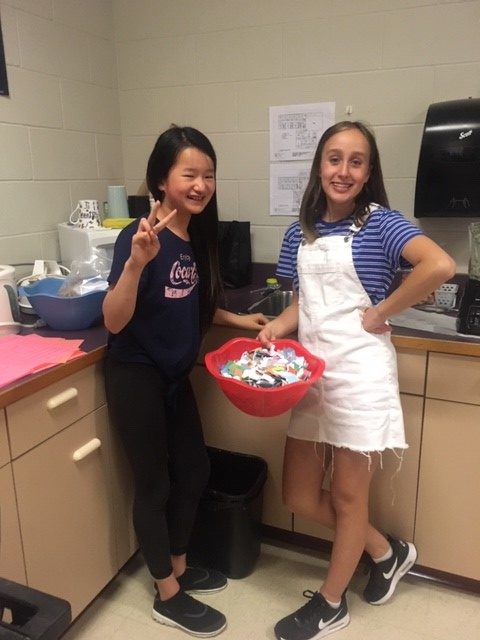 2019, Winnipeg, Manitoba, Canada
2019, Winnipeg, Manitoba, Canada
Holly & Tori, students at Henry G. Izatt (HGI) Middle School in Winnipeg, MB, were concerned about plant diversity, invasive species, and bee populations. They came up with a plan to address all three issues: seed bombs! Their plan includes educating young students at an elementary school before they enter HGI by providing them with seed bombs and a little workshop on how to plant them and what the benefits are.
“This is important for our community because our school has recently placed beehives on the school roof. We are worried that the bees will not have enough pollen to support the ecosystem and their hive. Bees are important to our watershed because they pollinate plants and crops… Planting wildflowers around the community will provide food for the bees to help grow our bee population and raise awareness.”

Biodegradable Sunscreen
2019, Shoal Lake, Manitoba, Canada

Bailey Ostash and Nadia Nickel are students at Shoal Lake School in Shoal Lake, Manitoba. Living in the Lake Winnipeg Watershed, they became worried about the algal blooms appearing on lakes in the area.
“On a hot sunny day, you are going to the beach. What’s one of the first things you do? Most people, as soon as they get to the beach, put on sunscreen. Then, they go into the water… One of our main concerns is that sunscreen [can be] full of many harmful chemicals that harm our watershed.”
Their solution was to create their own homemade, natural, biodegradable sunscreen. They will educate students in their school and people in their community on ways that they can reduce their impacts on their watershed with simple solutions like eco-friendly sunscreen. They plan to set up at local farmer’s markets and craft shows to spread their message and their product.
“It has been such a rewarding project. [Bailey & Nadia have] inspired me to learn more and get more involved with other groups and activities.” – Benita Shwaluk, Teacher, Shoal Lake School

Cigarette Butt Disposal
 2019, The Pas, Manitoba, Canada
2019, The Pas, Manitoba, Canada
Margaret Barbour Collegiate students Blaze Head & Christian Tilling wanted to make their school yard a cleaner place. They looked at the trash on the school property and noticed that, much like many places, the majority of the trash was comprised of cigarette butts. They decided they wanted to do something about it, so they came up with a plan to reduce the amount of cigarette butt waste they were seeing by having a disposal container installed.
“This project will help our environment by reducing the cigarettes and chemicals going into our watershed and contaminating our rivers and ground water.”

A Toothbrush’s Journey
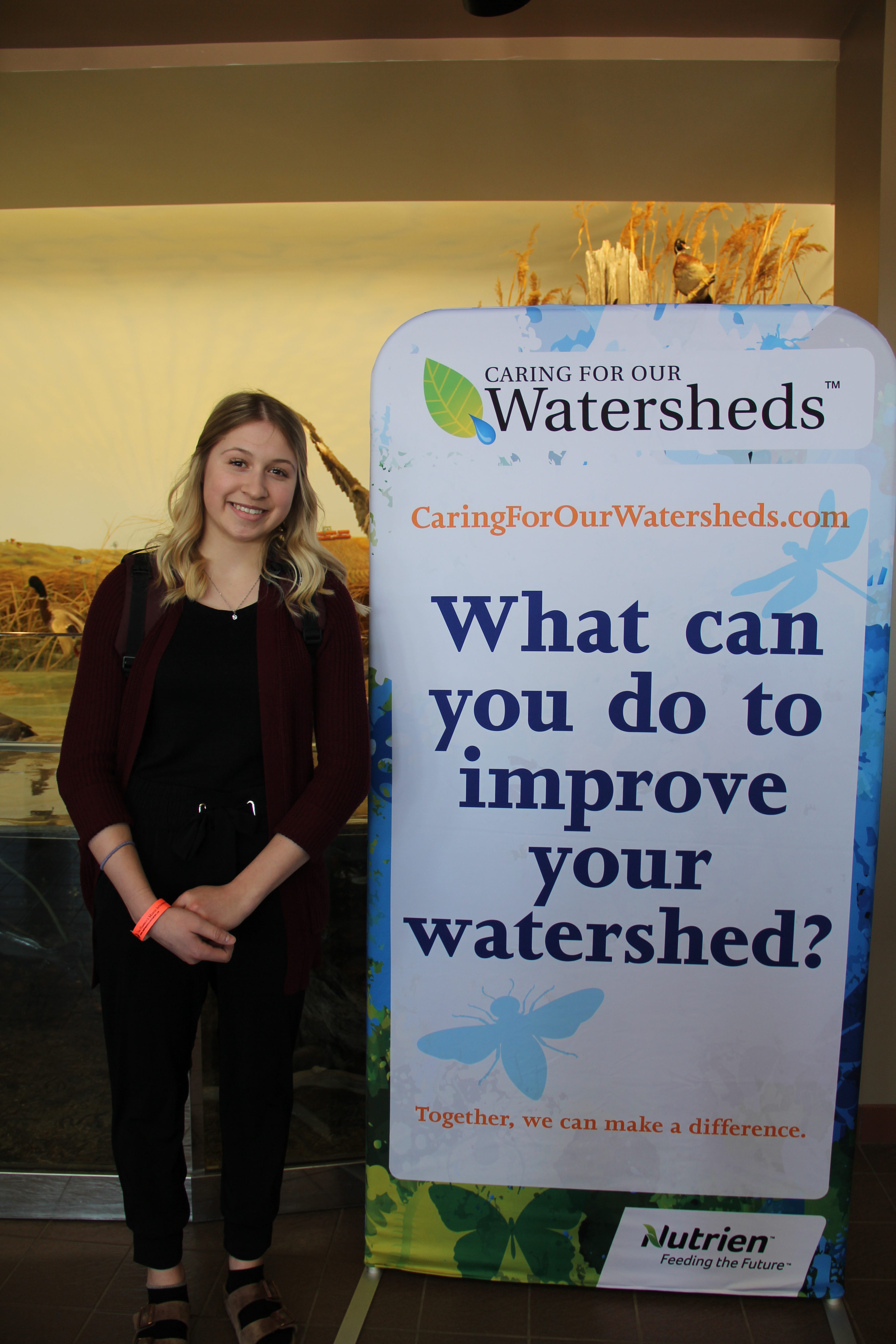 You may not know this, but plastic toothbrushes create major toothaches for our environment.
You may not know this, but plastic toothbrushes create major toothaches for our environment.
When student Jenn Fossay from Warren Collegiate in Warren, Manitoba, learnt that plastic toothbrushes take over 400 years to decompose, she knew that she had to come up with a solution.
To raise awareness about the negative effects of plastic toothbrushes on the environment, Jenn wrote and illustrated a children’s book to educate the next generation. The book takes readers through the life-cycle of a toothbrush lost down the storm drain. Once the toothbrush makes its way into the environment, it begins negatively impacting the lives of marine animals. Continue reading
